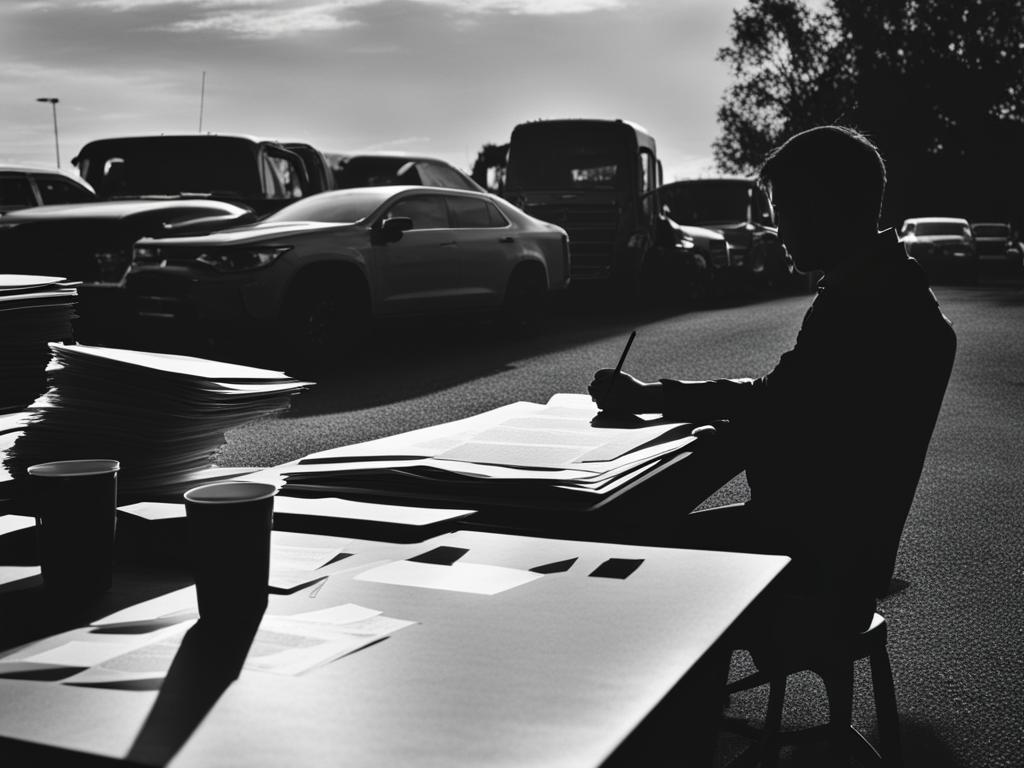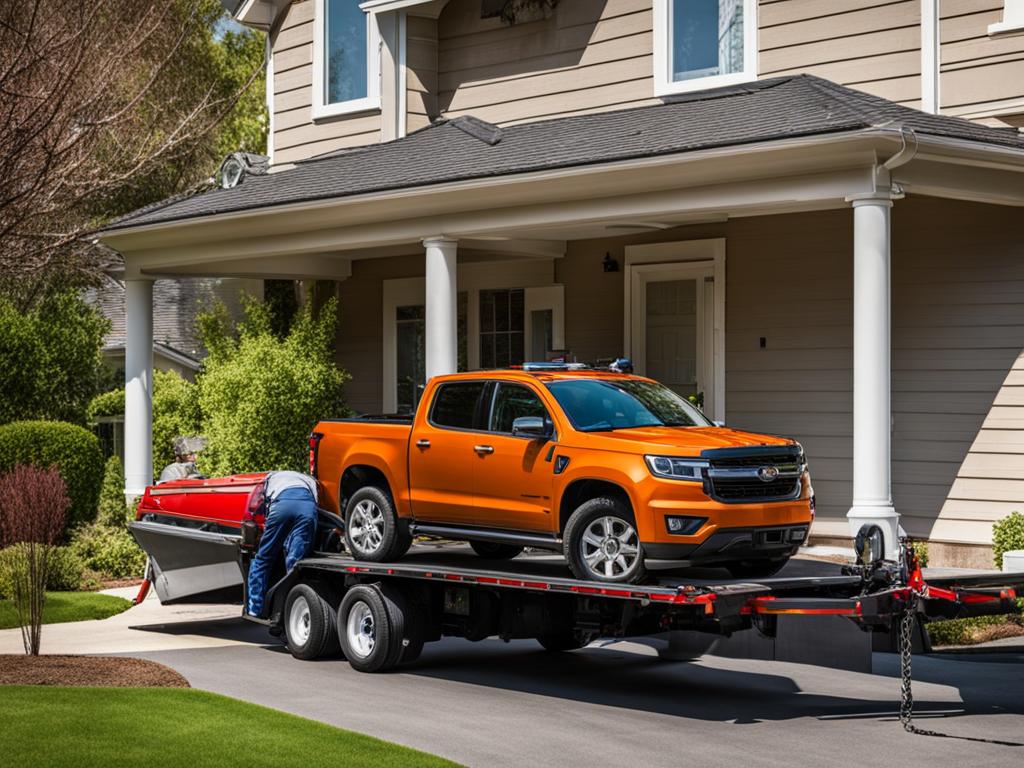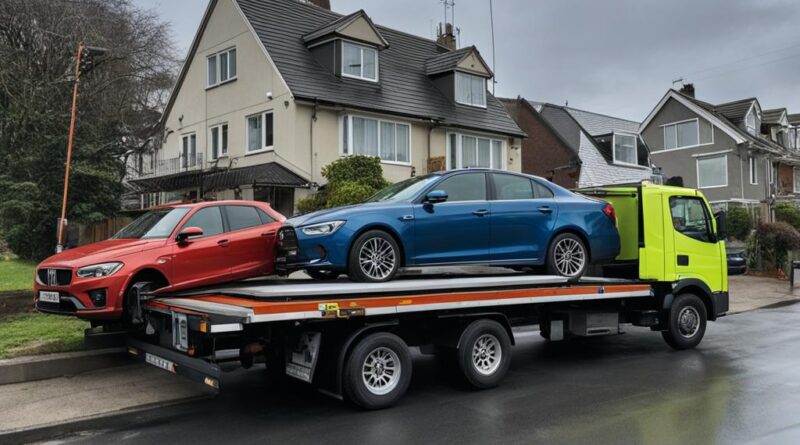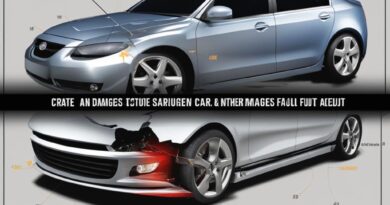Partial Payments: Can My Car Be Repossessed?
Making partial payments on your car loan may seem like a way to manage your finances when money is tight. However, it’s important to understand the potential consequences of this approach. In this article, we will explore whether your car can be repossessed if you make partial payments and the impact it can have on your car loan and financial stability.
When you sign a car loan agreement, you enter into a legal contract with the lender. This contract typically requires you to make full and timely payments toward the loan. Making only partial payments is considered a breach of contract, which gives the lender the right to repossess your vehicle.
While some lenders may offer grace periods or consider alternative arrangements with valued customers, there is no legal requirement for them to do so. Ultimately, a partial payment is not considered a full payment, and lenders can exercise their right to repossess the vehicle for non-payment.
It’s important to note that car repossession is a serious matter that can have long-lasting negative effects on your credit and financial stability. Understanding the consequences and exploring alternative solutions can help you navigate this challenging situation.
Key Takeaways:
- Making partial payments on your car loan can result in repossession as it is considered a breach of contract.
- Lenders are not legally obligated to offer grace periods or alternative arrangements for partial payments.
- Repossession can have significant negative effects on your credit and financial stability.
- Communicating with your lender and exploring alternative solutions is crucial to avoid repossession.
- Seeking legal help or engaging in financial planning can provide valuable guidance in challenging repossession situations.
Understanding Car Repossession
Car repossession is the legal process of seizing a vehicle to satisfy a debt. When a borrower defaults on their car loan by failing to make payments, the lender has the right to repossess the vehicle. Each state has its own laws governing repossession, and lenders may repossess vehicles ‘peacefully’ without a court order in some cases. It’s important to note that repossession can have long-lasting negative effects on your credit and financial stability.
| Consequences of Car Repossession | Options to Avoid Repossession |
|---|---|
|
|
The Consequences of Partial Payments
Making partial payments on your car loan can have severe consequences. Even if you have a good repayment history, a partial payment is not considered a full payment and can still result in repossession. Additionally, partial payments can lead to increased interest rates and fees, making it more difficult to catch up on missed payments. It is crucial to communicate with your lender and find a solution that works for both parties to avoid repossession.
Default on Car Payments
When you default on your car payments, it means that you have failed to fulfill the terms of your loan agreement by not making the required payments on time. Defaulting on car payments is a serious issue that can have long-lasting consequences. It not only puts your vehicle at risk of repossession but also negatively impacts your credit score.
Defaulting on car payments can result in:
- Repossession of the vehicle
- Negative impact on your creditworthiness
- Increased interest rates and fees
- Difficulty obtaining future loans or credit
Partial payments do not excuse or prevent defaulting on car payments. Even if you make partial payments regularly, if you consistently fail to make the full payment amount as outlined in your loan agreement, you are still considered in default.
Consequences of Missed Car Payments
Missing car payments or making partial payments can have severe consequences, including:
- Repossession of the vehicle: Your lender has the right to repossess the vehicle if you consistently miss payments or make partial payments. Once your car is repossessed, you may face challenges in getting it back, and you may still be responsible for outstanding loan payments or the difference between the car’s value and the remaining balance.
- Negative impact on your credit score: Missed and partial payments can significantly lower your credit score. A lower credit score can make it difficult to secure future loans or credit, affecting your financial stability and limiting your options.
- Increased interest rates and fees: Defaulting on car payments or making partial payments can result in increased interest rates and fees. Lenders may view partial payments as a sign of financial instability and may adjust your loan terms accordingly.
It is important to understand the consequences of missed and partial payments and take proactive steps to ensure timely and full payments. Communicating with your lender and exploring alternative payment arrangements can help you avoid repossession and mitigate the negative impact on your credit score.-
| Consequences of Partial Payments | Consequences of Missed Payments |
|---|---|
| Increased interest rates and fees | Repossession of the vehicle |
| Limited options for refinancing or new loans | Negative impact on credit score |
| Risk of legal action from the lender | Difficulty in getting the vehicle back after repossession |

Do All Partial Payments Lead to Repossession?
When it comes to making partial payments on your car loan, the question that often arises is whether all partial payments automatically lead to repossession. The answer is no. While partial payments are considered a breach of the loan agreement, some lenders may be willing to work with borrowers to find alternative solutions. It is important to remember that each lender has their own policies and considerations when it comes to partial payments and repossession.
Some lenders may take into account the borrower’s credit history and financial circumstances before deciding on the appropriate course of action. This could include providing a grace period, allowing for alternative payment arrangements, or offering assistance programs to help borrowers catch up on missed payments. However, it is crucial to communicate promptly with your lender and work out a solution that satisfies both parties to avoid repossession.
“Not all partial payments automatically lead to repossession. Some lenders may consider the borrower’s credit history and provide a grace period or alternative payment arrangements.”
It is important to note that partial payments, although they may be accepted by some lenders, are not considered full payments. Defaulting on even a single payment can still have serious consequences and impact your financial stability. The best approach is to prioritize making timely and full payments to avoid any potential risks of repossession.
By maintaining open lines of communication, negotiating with your lender, and exploring potential solutions, you can increase the likelihood of finding a resolution that prevents repossession. Remember, it is always in your best interest to honor the terms of your loan agreement and fulfill your financial obligations.
Next, let’s delve deeper into what happens during a repossession and discuss the consequences of defaulting on car payments.
What Happens During a Repossession
During a car repossession, the lender or a professional repo company takes possession of the vehicle to satisfy the debt. Repossessions can occur ‘peacefully’ without a court order in some states, while in other cases, the lender may obtain a court order to repossess the car.
Once the repossession takes place, it is important to note that the lender can still pursue legal actions, such as suing for a deficiency judgment, even after the repossession. This means that you may still be held responsible for the remaining balance of the loan, even if your vehicle has been repossessed.
To illustrate the process of a car repossession, take a look at the example table below:
| Stage | Description |
|---|---|
| Missed Payments | The borrower defaults on their car loan by failing to make payments on time. |
| Notice of Default | The lender sends a notice of default to the borrower, informing them of the missed payments and giving them an opportunity to catch up. |
| Repo Order | If the borrower fails to respond or make the necessary payments, the lender obtains a court order allowing them to repossess the vehicle. |
| Repossession | The lender or repo company locates and takes possession of the vehicle, either ‘peacefully’ or with a court order, depending on the state laws. |
| Deficiency Judgment | The lender has the right to sue the borrower for the remaining balance of the loan after the repossession, known as a deficiency judgment. |
How Does Filing Bankruptcy Stop Repossession?
If you’re facing the possibility of car repossession, filing for bankruptcy can provide temporary relief and help you stop repossession in its tracks. When you initiate bankruptcy proceedings, an automatic stay is issued, which halts all collection efforts, including repossession. This stay gives you the opportunity to assess your financial situation and explore options to keep your vehicle.
There are two common types of bankruptcy that may help you avoid repossession:
Chapter 7 Bankruptcy
Chapter 7 bankruptcy, also known as liquidation bankruptcy, allows you to discharge unsecured debts, including your car loan. However, to keep your vehicle, you’ll need to reaffirm the debt by agreeing to continue making payments. Depending on your financial circumstances, you may be able to negotiate new terms with the lender, such as reducing the interest rate or extending the loan period.
Chapter 13 Bankruptcy
If you want to keep your car but are struggling to catch up on missed payments, Chapter 13 bankruptcy could be a viable option. Through a structured repayment plan, you can spread out your unpaid car loan balance over a three to five-year period. This allows you to make affordable monthly payments and catch up on missed payments while protecting your vehicle from repossession.
Keep in mind that filing for bankruptcy is a complex legal process, and the specific implications will depend on your unique financial situation. It’s important to consult with a bankruptcy attorney who can guide you through the process and help you determine the best course of action.

| Filing Bankruptcy | Pros | Cons |
|---|---|---|
| Chapter 7 Bankruptcy |
|
|
| Chapter 13 Bankruptcy |
|
|
How Does Chapter 7 Help with Repossessions
Chapter 7 bankruptcy can be a valuable tool in stopping car repossession and resolving car loan defaults. When facing repossession, filing for Chapter 7 bankruptcy can provide you with options to either pay off the car loan in full or negotiate new terms with the lender.
Under Chapter 7 bankruptcy, you may have the opportunity to have some or all of your debts discharged, providing financial relief and the potential to keep your vehicle. However, it is crucial to understand that the process involves arranging a new installment agreement or demonstrating your ability to make steady payments to retain ownership of your car.
If you choose to pay off the car loan in full, Chapter 7 bankruptcy can eliminate other unsecured debts, which may free up funds to fulfill your vehicle payments and prevent repossession. On the other hand, if negotiating new terms with the lender is a more viable option, the bankruptcy court can help facilitate a resolution that satisfies both parties.
Consulting with a bankruptcy attorney is crucial when considering Chapter 7 bankruptcy as a potential solution for car repossession. An attorney can guide you through the process, explain the implications, and ensure that you fulfill the necessary requirements while working towards securing the future of your vehicle.
Benefits of Chapter 7 Bankruptcy for Stopping Repossession:
- Opportunity to pay off the car loan in full
- Potential discharge of other unsecured debts
- Possibility to negotiate new terms with the lender
- Protection from further collection actions
Considerations for Chapter 7 Bankruptcy:
- Arranging a new installment agreement
- Demonstrating the ability to make steady payments
- Understanding the long-term financial implications
- Consulting with a bankruptcy attorney for guidance
Chapter 7 bankruptcy can be an effective strategy to halt car repossession and regain control over your finances. By exploring this legal option and seeking professional advice, you can take steps towards resolving your car loan default and protecting your vehicle.
| Chapter 7 Bankruptcy | Stop Repossession | Car Loan Default |
|---|---|---|
| Discharge other unsecured debts | Pay off the car loan in full | Negotiate new terms with the lender |
| Protection from further collection actions | Arranging a new installment agreement | Demonstrate ability to make steady payments |
How Does Chapter 13 Help with Repossessions
Chapter 13 bankruptcy can be a viable option to prevent repossession by including the car loan in a structured repayment plan. When facing the possibility of repossession, Chapter 13 bankruptcy allows individuals to reorganize their debts and create a manageable payment plan that typically spans three to five years. This type of bankruptcy is particularly beneficial for those who have a regular income and want to retain their assets, such as their car.
By filing for Chapter 13 bankruptcy, individuals can stop repossession proceedings and protect their vehicle from being seized by creditors. The automatic stay that goes into effect upon filing halts all collection efforts, providing immediate relief and a chance to regain control of your financial situation.
During the Chapter 13 bankruptcy process, a repayment plan is created to address outstanding debts, including the car loan. The plan takes into account the individual’s income and expenses, allowing for reduced monthly payments and adjusted interest rates. This can make the repayment more manageable and affordable, ensuring that the borrower can continue making payments and retain possession of their vehicle.
It’s important to note that Chapter 13 bankruptcy is not a solution for everyone. It requires careful consideration and the guidance of a bankruptcy attorney who can assess your specific circumstances and eligibility for this type of bankruptcy. Consulting with an experienced attorney is crucial to navigating the complexities of the bankruptcy process and ensuring that Chapter 13 is the right solution for your repossession concerns.
Benefits of Chapter 13 Bankruptcy for Repossession Prevention:
- Protection against repossession: Chapter 13 bankruptcy provides an automatic stay that stops repossession proceedings and gives individuals the opportunity to develop a repayment plan to retain their vehicle.
- Structured repayment plan: Through Chapter 13 bankruptcy, individuals can create a manageable repayment plan that fits their income and expenses, reducing monthly payments and adjusting interest rates.
- Asset retention: Unlike Chapter 7 bankruptcy, which may require liquidation of assets, Chapter 13 allows individuals to retain their possessions, including their car.
- Debt consolidation: Chapter 13 bankruptcy consolidates debts into a single repayment plan, making it easier to manage and prioritize outstanding obligations.
Chapter 13 bankruptcy can provide a lifeline for those facing the threat of car repossession. By seeking guidance from a bankruptcy attorney and understanding the implications of this type of bankruptcy, individuals can take proactive steps to protect their assets and regain control of their financial future.
| Pros | Cons |
|---|---|
| Protection against repossession | Requires a regular income to qualify |
| Structured repayment plan | Longer process compared to Chapter 7 bankruptcy |
| Asset retention | Strict adherence to the repayment plan is necessary |
| Debt consolidation | May involve higher attorney fees |
Consulting with a bankruptcy attorney is crucial when considering Chapter 13 bankruptcy as a solution to prevent repossession. An attorney can provide personalized guidance, help assess your eligibility, and navigate the legal complexities to ensure the best possible outcome for your repossession concerns.

Preventing Car Repossession
Preventing car repossession is crucial in order to maintain ownership of your vehicle and protect your credit. There are several steps you can take to avoid repossession and address financial difficulties proactively.
1. Communicate with Your Lender
Open and honest communication with your lender is key to preventing car repossession. If you’re experiencing financial hardship or anticipate difficulties in making your car loan payments, reach out to your lender as soon as possible. By explaining your situation and demonstrating your willingness to resolve the issue, you may be able to negotiate alternative payment arrangements that can help you avoid repossession.
2. Explore Alternative Payment Arrangements
When communicating with your lender, discuss potential alternative payment arrangements. This may include adjusting the monthly payment amount based on your current financial situation, deferring payments temporarily, or extending the loan term to lower monthly payments. Lenders understand that unexpected financial challenges can arise, and they may be willing to work with you to find a solution that allows you to maintain ownership of your vehicle.
3. Consider Selling the Car
If your financial situation makes it impossible to keep up with car loan payments, consider selling the vehicle and using the proceeds to pay off the loan. This option may be more viable if you have substantial equity in the car or if you can find a buyer willing to pay off the remaining balance. By selling the car voluntarily, you can avoid repossession and the associated negative impact on your credit.
4. Refinance the Loan
Another option to prevent car repossession is refinancing the loan. If you’re struggling with high monthly payments, refinancing can help lower them by extending the loan term or securing a lower interest rate. This can make the payments more manageable and allow you to avoid repossession. However, it’s important to carefully review the terms and conditions of the new loan to ensure it aligns with your financial goals.
By taking proactive measures, such as communicating with your lender and exploring alternative payment arrangements, you can prevent car repossession and protect your credit. It’s crucial to address financial issues promptly and seek assistance when needed to secure your vehicle ownership and maintain your financial stability.
Rights During Car Repossession
While laws governing car repossession vary by state, borrowers have rights during the repossession process. It is crucial to understand your rights to protect yourself and ensure that the repossession follows the proper legal procedures.
Repossession Laws
Repossession laws differ from state to state, so it is essential to familiarize yourself with the specific laws in your state. These laws outline the conditions under which a lender can repossess a vehicle, the notice they must provide, and the procedures they must follow.
“Understanding repossession laws can help you determine if your rights are being violated during the repossession process.” – Legal Expert
By being aware of the laws that govern car repossession, you can identify any potential violations and take appropriate action if necessary.
Breach of Peace and Car Repossession
One crucial aspect of repossession laws is the prohibition of a breach of peace during the repossession process. In many states, lenders are not allowed to use physical force, threats, or property damage during repossession. If the repossession involves a breach of peace, it may be considered illegal.
If you believe that a breach of peace occurred during the repossession of your vehicle, consult with a legal professional who can guide you on how to address the situation.
Retrieving Personal Belongings
During a car repossession, you have the right to retrieve your personal belongings from the repossessed vehicle. This includes any possessions that were in the car at the time of repossession. However, it is essential to follow the proper procedure and coordinate with the lender or the repossession company to arrange for the retrieval of your belongings.
Be sure to document the condition and contents of the vehicle before and after repossession and keep records of any communication regarding the retrieval of your personal belongings.

Understanding your rights during car repossession can help you protect yourself and ensure that the process follows the appropriate legal guidelines. By familiarizing yourself with repossession laws, watching out for breaches of peace, and knowing how to retrieve your personal belongings, you can navigate the repossession process with greater confidence and peace of mind.
Continue reading to learn about the consequences of car repossession and how to avoid it.
Consequences of Car Repossession
Car repossession can have significant consequences that can impact your financial well-being, particularly your credit score and access to future financing options.
One of the primary repercussions of car repossession is the negative impact it has on your credit score. When your vehicle is repossessed, it is reported to the credit bureaus, resulting in a significant drop in your credit rating. This can make it challenging to secure loans or credit cards in the future, as lenders view repossession as a red flag indicating potential financial instability.
Furthermore, the effects of car repossession can linger on your credit report for up to seven years. During this time, the repossession will be visible to potential lenders, hindering your ability to obtain favorable loan terms or credit approvals. Even after the repossession is resolved and the vehicle is no longer in your possession, the negative impact on your credit remains.
It is crucial to prioritize timely and full payments to avoid repossession and protect your financial well-being. By maintaining consistent repayment behavior and addressing any financial challenges promptly, you can minimize the risk of repossession and maintain a positive credit history.
Avoiding Car Repossession
When it comes to avoiding car repossession, proactive measures play a vital role in protecting your vehicle and credit. By maintaining open lines of communication with your lender, promptly addressing any financial difficulties, and implementing effective financial planning strategies, you can significantly reduce the risk of repossession.
Effective Communication with Your Lender
Establishing clear and regular communication with your lender is essential. If you anticipate difficulties in making your car payments, informing your lender ahead of time allows them to better understand your situation and work with you to find potential solutions. By being upfront and honest, you can pave the way for negotiations and alternative payment arrangements.
Promptly Addressing Financial Difficulties
Financial difficulties can arise unexpectedly, such as a loss of income or unexpected expenses. When faced with these challenges, it is crucial to address them promptly. Seek out professional financial advice or counseling services that can help you navigate through difficult times and develop a feasible plan to regain control of your finances.
Implementing Effective Financial Planning
Financial planning is key to avoid car repossession. Take the time to develop a realistic budget that accounts for all your expenses, including your car loan payment. By actively managing your finances and prioritizing your car payments, you can ensure that you meet your financial obligations and avoid the risk of repossession.
“Proactive measures play a vital role in protecting your vehicle and credit.”
By maintaining open lines of communication with your lender, addressing financial difficulties promptly, and implementing effective financial planning strategies, you can take concrete steps to avoid car repossession and safeguard your financial well-being.

Seeking Legal Help for Repossession Issues
If you are facing repossession or have concerns about the repossession process, it is crucial to seek legal help from professionals experienced in this area. A bankruptcy attorney or an attorney specializing in consumer law can provide invaluable guidance and support. With their expertise, they can help you understand your rights, explore potential solutions, and navigate the legal complexities associated with repossession.
An attorney well-versed in car repossession laws will have a deep understanding of the legal framework and regulations in your specific state. They can help you assess the circumstances surrounding your repossession situation, providing customized advice tailored to your needs.
By collaborating closely with a bankruptcy attorney or a consumer law attorney, you can gain a clear understanding of the options available to you and make informed decisions to protect your interests. They can guide you through the process, offering insights into negotiation strategies, possible alternatives, and legal remedies.
“A skilled attorney who specializes in repossession matters can be a valuable asset when dealing with the complexities of repossession. They can analyze your specific situation, identify applicable car repossession laws, and provide expert legal advice that aligns with your circumstances.”
Whether you are at risk of repossession or navigating the aftermath of a repossession, legal help can make a significant difference in protecting your rights and finding a favorable resolution. Don’t hesitate to reach out to a bankruptcy attorney or a consumer law attorney to ensure you have a knowledgeable advocate in your corner.
The Role of a Bankruptcy Attorney
When it comes to repossession issues, a bankruptcy attorney can be an invaluable resource. They specialize in bankruptcy law and can guide you through the process of filing for bankruptcy. By leveraging bankruptcy laws and procedures, they can help you halt the repossession process and potentially keep your vehicle through Chapter 7 or Chapter 13 bankruptcy proceedings.
The Role of a Consumer Law Attorney
A consumer law attorney focuses on protecting consumers’ rights and interests. They can represent you in disputes with lenders, negotiate on your behalf, and challenge any improper or illegal repossession actions. They will work to ensure that your rights are upheld and explore legal avenues to rectify any wrongdoing.
| Benefits of Seeking Legal Help for Repossession Issues | Importance |
|---|---|
| Expert legal advice | To navigate the complexities and intricacies related to repossession laws and regulations. |
| Protection of rights | To ensure your rights are upheld throughout the repossession process and any subsequent legal proceedings. |
| Negotiation and representation | To negotiate with lenders, explore potential alternatives, and represent your interests in legal disputes. |
| Access to legal remedies | To explore all possible legal options, including bankruptcy, to prevent repossession or obtain compensation for any improper actions. |
| Peace of mind | Knowing that you have a knowledgeable and experienced legal professional by your side, advocating for your best interests. |
Seeking legal help can provide you with the expertise and support needed to navigate the intricate landscape of repossession laws and protect your rights. Don’t hesitate to reach out to a bankruptcy attorney or a consumer law attorney to discuss your concerns and explore potential solutions.
The Importance of Financial Planning
Financial planning is a critical component of avoiding car repossession. By implementing effective strategies and staying proactive, you can establish a solid foundation for maintaining control of your vehicle and meeting your financial obligations.
One of the key aspects of financial planning is creating a realistic budget. Take the time to evaluate your income and expenses, prioritizing your car loan payments within your budget. This will ensure that you allocate sufficient funds each month to cover your car loan and avoid any default.
Being proactive in addressing financial challenges is also crucial. If you anticipate any difficulties in making your car loan payments, take immediate action. Reach out to your lender and communicate your situation. They may be willing to work out alternative payment arrangements, such as modifying your payment schedule or temporarily reducing your monthly payments.
Regularly reviewing your financial situation is essential. Conduct periodic assessments of your income, expenses, and overall financial health. This will enable you to identify any potential red flags or areas where adjustments are necessary. By staying vigilant and making necessary adjustments, you can ensure that your budget remains realistic and manageable.
| Benefits of Financial Planning |
|---|
| 1. Provides a clear overview of your financial situation |
| 2. Helps prioritize loan payments and avoid default |
| 3. Enables proactive action in times of financial difficulty |
| 4. Facilitates regular review and adjustment of your budget |
By incorporating these financial planning practices into your routine, you will strengthen your financial stability and reduce the risk of car repossession. Remember, open communication with your lender and a proactive approach are key to safeguarding your vehicle and maintaining control of your finances.

Conclusion
In conclusion, making partial payments on your car loan can put your vehicle at risk of repossession. While some lenders may be more lenient and willing to work out alternative arrangements, there is no guarantee. It is important to communicate with your lender, explore potential solutions, and prioritize timely and full payments to protect your vehicle and credit. Seeking legal help or engaging in financial planning can also be beneficial in navigating the complexities of repossession and maintaining control of your finances.
FAQ
Can my car be repossessed if I make partial payments?
Making partial payments on your car loan can result in repossession as it is considered a breach of contract. While some lenders may offer grace periods or work out arrangements with valued customers, there is no legal requirement for lenders to do so. A partial payment is not considered a full payment, and lenders have the right to repossess the vehicle for non-payment.
What is car repossession?
Car repossession is the legal process of seizing a vehicle to satisfy a debt. When a borrower defaults on their car loan by failing to make payments, the lender has the right to repossess the vehicle. Each state has its own laws governing repossession, and lenders may repossess vehicles ‘peacefully’ without a court order in some cases. It’s important to note that repossession can have long-lasting negative effects on your credit and financial stability.
What are the consequences of making partial payments on my car loan?
Making partial payments on your car loan can have severe consequences. Even if you have a good repayment history, a partial payment is not considered a full payment and can still result in repossession. Additionally, partial payments can lead to increased interest rates and fees, making it more difficult to catch up on missed payments. It is crucial to communicate with your lender and find a solution that works for both parties to avoid repossession.
Do all partial payments automatically lead to repossession?
Not all partial payments automatically lead to repossession. Some lenders may consider the borrower’s credit history and provide a grace period or alternative payment arrangements. However, it is essential to remember that partial payments are still a breach of the loan agreement. The best approach is to communicate with your lender and work out a solution to avoid repossession.
What happens during car repossession?
During a repossession, the lender or a repo company takes possession of the vehicle to satisfy the debt. Repossessions can occur ‘peacefully’ without a court order in some states, while in other cases, the lender may obtain a court order to repossess the car. It is important to note that the lender can still pursue legal actions, such as suing for a deficiency judgment, even after the repossession.
How does filing bankruptcy stop repossession?
Filing for bankruptcy can provide temporary relief from repossession. When you file for bankruptcy, an automatic stay is issued, halting all collection efforts, including repossession. Chapter 7 and Chapter 13 bankruptcy options may help you keep your vehicle, but it is essential to consult with a bankruptcy attorney to understand the specific implications for your situation.
How does Chapter 7 help with repossession?
Chapter 7 bankruptcy can potentially help with repossession by allowing you to either pay off the car loan in full or negotiate new terms with the lender. However, it is crucial to arrange a new installment agreement or demonstrate your ability to make steady payments to keep the vehicle. Consult with a bankruptcy attorney to understand the implications and requirements of Chapter 7 bankruptcy.
How does Chapter 13 help with repossession?
Chapter 13 bankruptcy can be a viable option to prevent repossession by including the car loan in a structured repayment plan. Depending on the terms of the loan and the borrower’s financial situation, Chapter 13 bankruptcy may allow for reduced monthly payments and adjusted interest rates. It is crucial to consult with a bankruptcy attorney to determine if Chapter 13 bankruptcy is the right solution for your repossession concerns.
How can I prevent car repossession?
There are steps you can take to prevent car repossession. These include communicating with your lender to explore alternative payment arrangements, selling the car and paying off the loan, or refinancing the loan to lower monthly payments. It is crucial to address financial issues promptly and proactively to avoid repossession.
What rights do I have during car repossession?
While laws governing car repossession vary by state, borrowers have rights during the repossession process. In many states, repossession must not involve a breach of peace, which includes the use of physical force or property damage. Additionally, borrowers have the right to retrieve personal belongings from the repossessed vehicle. Familiarize yourself with the specific repossession laws in your state to understand your rights.
What are the consequences of car repossession?
Car repossession has significant consequences, including a negative impact on your credit score and limited access to future financing options. Repossession can stay on your credit report for up to seven years, making it challenging to secure loans or credit in the future. It is crucial to prioritize timely and full payments to avoid repossession and protect your financial well-being.
How can I avoid car repossession?
By maintaining open lines of communication with your lender, addressing financial difficulties promptly, and proactively planning your finances, you can take steps to avoid car repossession. It is essential to be proactive in finding solutions that work for both parties and prioritize timely and full payments to protect your vehicle and credit.
Where can I seek legal help for repossession issues?
If you are facing repossession or have concerns about the repossession process, seeking legal help from a bankruptcy attorney or an attorney specializing in consumer law can provide invaluable guidance. An attorney can help you understand your rights, explore potential solutions, and navigate the legal complexities associated with repossession.
How important is financial planning in avoiding car repossession?
Financial planning plays a crucial role in avoiding car repossession. By creating a realistic budget, prioritizing loan payments, and being proactive in addressing financial challenges, you can ensure that you meet your financial obligations and avoid repossession. Regularly reviewing your financial situation and making necessary adjustments can help you stay on track and maintain control of your vehicle.




